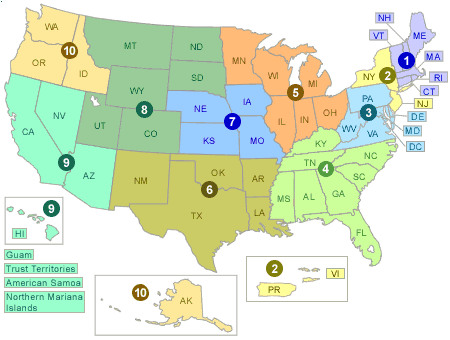Environmental Finance Centers
Find the Environmental Finance Center (EFC) serving your area.

The Environmental Finance Centers (EFCs) deliver targeted technical assistance to, and partner with states, tribes, local governments, and the private sector in providing innovative solutions to help manage the costs of environmental financing and program management.
EPA Region 1 (serving Connecticut, Maine, Massachusetts, New Hampshire, Rhode Island, and Vermont)
University of Southern Maine Exit
Focus: Enhancing the capacity of public and private clients to pay for the growing costs of protecting the environment and to be prepared to manage both chronic and acute problems of environmental protection and finance.
EPA Region 2 (serving New Jersey, New York, Puerto Rico, and the U.S. Virgin Islands)
Syracuse University Exit
Focus: Advancing efficient and effective governance and problem-solving through leadership development and community participation in decision-making processes, with a focus on sustainable materials management; water, wastewater, and stormwater; natural resource management, and planning.
EPA Region 3 (serving Delaware, District of Columbia, Maryland, Pennsylvania, Virginia, and West Virginia)
University of Maryland Exit
Focus: Offering technical assistance through direct community engagement; policy analysis and decision support tools; communications and outreach; and experiential learning and leadership development to strengthen the capacity of local decision-makers to manage change for a healthy environment and an enhanced quality of life.
EPA Region 4 (serving Alabama, Florida, Georgia, Kentucky, Mississippi, North Carolina, South Carolina, and Tennessee)
University of North Carolina, Chapel Hill Exit
Focus: Dedicated to enhancing the ability of governments and other organizations to provide environmental programs and services in fair, effective, and financially sustainable ways.
EPA Region 5 (serving Illinois, Indiana, Michigan, Minnesota, Ohio, and Wisconsin)
Michigan Technological University Exit
Focus: Providing training, technical assistance, guidance publications and applied research related to environmental infrastructure (water, sanitary sewer, and storm sewer systems, landfills, recycling programs, etc.) and its efficient management. The center focuses on implementing asset management as a business practice for infrastructure owners.
EPA Region 6 (serving Arkansas, Louisiana, New Mexico, Oklahoma, and Texas)
University of New Mexico Exit
Focus: Providing training and technical assistance in a variety of areas to help state and local governments, particularly water and wastewater utilities, build their technical, managerial, and financial capacity in order to sustainably operate facilities in compliance with regulations. Providing assistance to tribal drinking water systems in all capacity areas, technical, managerial, and financial assistance, including operator certification.
EPA Region 7 (serving Iowa, Kansas, Missouri, and Nebraska)
Wichita State University Exit
Focus: Providing professional training, technical assistance and applied research on a variety of environmental topic areas to meet the financial challenges of environmental compliance while strengthening the capacity of local decision-makers in analyzing environmental issues and sustainable communities.
EPA Region 9 (serving Arizona, California, Hawaii, Nevada, American Samoa, Commonwealth of the Northern Mariana Islands, Federated States of Micronesia, Guam, Marshall Islands, and Republic of Palau)
California State University, Sacramento
Focus: Supporting and improving the capabilities of Region 9 by providing resource tools and on-site training and technical assistance related to financing and planning of environmental and public health programs in areas such as drinking water, wastewater, stormwater, groundwater, and solid waste management.
EPA Region 10 (serving Alaska, Idaho, Oregon, and Washington)
Rural Community Assistance Corporation
Focus: Providing infrastructure technical assistance, training, research and financial tools to support increased capacity and leadership development and enhancing the ability of communities, tribes and governments to effectively manage, problem solve, and envision financially sustainable infrastructure solutions and evaluate the financial and cultural impacts of adaptation and relocation.
